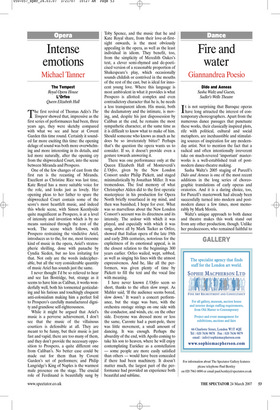Intense emotions
Michael Tanner
The Tempest Royal Opera House L’Orfeo Queen Elizabeth Hall
The first revival of Thomas Adès’s The Tempest showed that, impressive as the first series of performances had been, three years ago, they were sketchy compared with what we see and hear at Covent Garden this time round. Certainly it sounded far more exciting this time: the opening deluge of sound was both more overwhelming and more interesting in its details, and led more naturally, after the opening cry from the shipwrecked Court, into the scene between Miranda and Prospero.
One of the few changes of cast from the first run is the recasting of Miranda. Excellent as Christine Rice was last time, Kate Royal has a more suitable voice for the role, and looks just as lovely. Her opening pleas to her father to spare the shipwrecked Court contain some of the score’s most heartfelt music, and indeed this whole scene, with Simon Keenlyside quite magnificent as Prospero, is at a level of intensity and invention which is by no means sustained through the rest of the work. The scene which follows, with Prospero restraining the vindictive Ariel, introduces us to the, for me, most tiresome kind of music in the opera, Ariel’s stratospheric shrilling, done with panache by Cyndia Sieden, but no less irritating for that. Not only are the words indecipherable, but all the very considerable quantity of music Ariel has sounds just the same.
I never thought I’d be so relieved to hear and see Ian Bostridge, but, strange as it seems to have him as Caliban, it works wonderfully well, both his tormented gesticulating and his furious and touchingly eloquent anti-colonialism making him a perfect foil to Prospero’s carefully manufactured dignity and grandiose self-righteousness.
While it might be argued that Ariel’s music is a perverse achievement, I don’t see that the music of the villainous courtiers is defensible at all. They are meant to be funny, but their music is just fast and vapid, there are too many of them, and they don’t provide the necessary opposition to Prospero, a quite different one from Caliban’s. No better case could be made out for them than by Covent Garden’s set of performers; and Philip Langridge’s King of Naples is the warmest male presence on the stage. The crucial role of Ferdinand is beautifully sung by Toby Spence, and the music that he and Kate Royal share, from their love-at-firstsight onwards, is the most obviously appealing in the opera, as well as the least individual in idiom. They benefit, too, from the simplicity of Meredith Oakes’s text, a clever semi-rhymed and de-poeticised version of a reasonable proportion of Shakespeare’s play, which occasionally sounds childish or contrived in the mouths of the rest of the cast, but is ideal for innocent young love. Where this language is most ambivalent in what it provides is what Prospero is allotted: complex and even contradictory character that he is, he needs a less transparent idiom. His music, both the declamatory and the intimate, is moving, and, despite his just dispossession by Caliban at the end, he remains the most sympathetic character, at the same time as it is difficult to know what to make of him. Should someone who knows as much as he does be so inveterately bitter? Perhaps that’s the question the opera wants us to consider. If so, it doesn’t provide even a gesture towards answering it.
There was one performance only at the Queen Elizabeth Hall of Monteverdi’s L’Orfeo, given by the New London Consort under Philip Pickett, and staged minimalistically by Jonathan Miller. It was tremendous. The foul memory of what Christopher Alden did to the first operatic masterpiece in his production for Opera North briefly resurfaced in my mind, and then was banished, I hope for ever. What was so marvellous about the New London Consort’s account was its directness and its intensity. The ardour with which it was played, and especially with which it was sung, above all by Mark Tucker as Orfeo, showed that Italian opera of the late 19th and early 20th centuries, notorious for the explicitness of its emotional appeal, is in the closest relation to the beginnings 300 years earlier. Orfeo wailed, wept, sobbed, as well as singing his lines with the utmost expressiveness. And he, like all the performers, was given plenty of time by Pickett to fill the text and the vocal line with meaning.
I have never known L’Orfeo seem so short, thanks to the often slow tempi. As Mahler said, ‘If the audience seems bored, slow down.’ It wasn’t a concert performance, but the stage was bare, with the orchestra onstage strings on one side with the conductor, and winds, etc. on the other side. Everyone was dressed more or less the same, Caronte had a punt-pole, there was little movement, a small amount of dancing. It was enough. Perhaps the absurdity of the end, with Apollo coming to take his son to heaven, where he will enjoy contemplating Euridice as a constellation — some people are more easily satisfied than others — would have been concealed if there had been machinery. It doesn’t matter much, the largest part of the performance had provided an experience both beautiful and sublime.


















































































 Previous page
Previous page